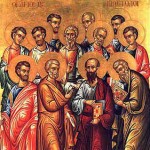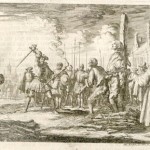Who chooses bishops/elders/pastors among the church?
Before you jump on me for my title, I’m using the traditional nomenclature. I’d prefer to simply use the term “elders,” which is the normal term in Scripture. However, for many among the church today, “elders” are different than “bishops” and both of those are different than “pastors.” So, if you feel they are different, then you can assume that I’m talking about all three in this post.
In Scripture, there are only two passages related to “choosing/appointing” bishops/elders/pastors:
When they [Paul and Barnabas] had preached the gospel to that city and had made many disciples, they returned to Lystra and to Iconium and to Antioch, strengthening the souls of the disciples, encouraging them to continue in the faith, and saying that through many tribulations we must enter the kingdom of God. And when they had appointed elders for them in every church, with prayer and fasting they committed them to the Lord in whom they had believed. (Acts 14:21-23 ESV)
This is why I [Paul] left you [Titus] in Crete, so that you might put what remained into order, and appoint elders in every town as I directed you… (Titus 1:5 ESV)
On the surface, it looks like Paul and Barnabas personally chose “elders” among the churches of Galatia (in Acts 14:23) and that Paul instructed Titus to personally choose “elders” among the churches (in each town) in Crete. And, that would definitely be a valid interpretation.
When we turn to later Christian writings, the interpretations become muddled:
Therefore, choose for yourselves bishops and deacons worthy of the Lord… (Didache 15:1)
Those [elders] therefore who were appointed by them [apostles], or afterward by other men of repute with the consent of the whole church… (1 Clement 44:3)
In the Didache, the author(s) definitely expected the church to choose “bishops” for themselves. There is no mention of bishops, elders, or deacons being appointed by others for the church.
Clement, meanwhile, seems to say that apostles and then later others appointed “elders.” However, he adds that little phrase “with the consent of the whole church,” which again muddles the answer. Was the just the apostles who chose “elders”? Was it later just “other men of repute” who chose elders? What does it mean that the whole church consented?
(Interestingly, while Ignatius has alot to say about “the bishop, the presbyters, and the deacons,” he does not mention who appointed or chose them. Likewise, Polycarp mentions “elders,” but he does not say who chose them.)
Of the four texts above (Acts, Titus, Didache, and 1 Clement) written by four different authors, is there any way that all four authors related the same way of choosing “bishops” and “elders” (or “pastors” if you prefer, although that term wasn’t used until much later).
If Acts 14:26 and Titus 1:5 indicate that ONLY Paul and Barnabas and ONLY Titus picked people to be “elders,” then we have to conclude that the Didache strays from that position.
Is it possible, though, that Luke did not intend to indicate that ONLY Paul and Barnabas were involved in appointing elders for the churches of Galatia? Is it possible that Paul did not intend to indicate that ONLY Titus was to appoint elders for the churches of Crete?
(By the way, within about 100 years of the texts listed here, the standard practice was for ONLY bishops to appoint bishops and elders, a practice which became known as successionism. But, as you can see, it was not that clear in the earliest Christian texts.)
The result of the success of the Lollard educational programme
I have thoroughly enjoyed studying some of the “heretical” groups of the middle ages, that is, groups of Christians who sprung up from place to place before Luther and the Reformation. Many of these groups bear striking resemblance to later Reformation-era groups, especially the Anabaptists and other “radical reformers.”
For example, in England, there was a group called “Lollards” who followed the “pre-reformer” John Wycliffe. (By the way, if you’re not familiar with Wycliffe, I’d encourage you to investigate him and the “Lollards.”) These groups of believers opposed the Catholic Church in several areas, specifically in regards to the clergy and transubstantiation. (In fact, their Catholic opponents often asked suspected Lollards if the bread was actually the body of Christ, to which the Lollards would reply that it was just a piece of bread, thus condemning them.)
In many ways, the religious leaders of the day did not know what to do about the Lollards, because they did not make sense to them. They didn’t know what to call the simple meetings that these believers held in homes and public places. They couldn’t understand why these “Lollards” kept quoting Scripture (in English, though, which was always suspect). Although there were a few “leaders” (from an outward perspective), the groups continued to thrive after the leaders were, um, removed.
Speaking to this last point, consider this passage in The Premature Reformation: Wycliffite Texts and Lollard History by Anne Hudson (Oxford: Clarendon Press, 1988):
If there were few ‘prophets’, in the mould of Swinderby, Thorpe, or Wyche, in the later period, there was a host of lesser figures, men and women, who in the course of their everyday activities proselytized, encouraged and upbraided the wavering, and fostered the faithful. It seems clear that the dominating figures were not to be found in Lollardy of the last sixty years before Lutheranism. In part this is doubtless the effect of the continued persecution, and most notably of Arundel’s Constitutions; conventional wisdom would add the effect of Oldcastle’s rebellion in removing lay support for the heretics amongst the aristocracy and gentry. But it is worth examining whether in part it is not also the result of the success of the Lollard educational programme. For it is clear that the communities themselves had effectively taken over from the individual preachers as teachers and maintainers of heresy. (449-50)
In a theology course, a seminary professor once told me that if the seminaries were doing their job correctly and the church was doing its job correctly, then the seminaries would not need to exist. So, considering the quote above, it seems that the fact that seminaries continue to exist is a demonstration of the failure of that educational program.
On the other hand, those who persecuted the Lollards for their “heresy” found that their “educational programme” was vastly successful. And, what was that educational program? “The communities themselves had effectively taken over from the individual preachers as teachers and maintainers of heresy” (with “heresy” referring to the beliefs and practices of the Lollards).
What would happen if communities of believers today took over from “the individual preachers as teachers and maintainers” of the way of Christ? Would we see a similar success to that “educational programme”?
We can’t let just anyone preach and teach
For the last few weeks, I’ve been studying church gatherings during various time periods from the post-apostolic times through the middle ages and Reformation and into the modern period. And, I’ve learned something interesting… it’s often seen as extremely dangerous to let just anyone preach and teach.
Early in the book of Acts, when persecution arose in Jerusalem, all of the believers scattered to the surrounding area. What did they do as they were scattered? “Now those who were scattered went about preaching the word.” (Acts 8:4 ESV)
However, something happened over the next few hundred years. Eventually, “preaching” (in Acts, it referred to proclaiming the gospel) became the sole domain of those who were duly trained and appointed by “the Church.”
Of course, groups rose up here and there and recognized the growing problems in “the Church.” So, what did they do? They went about preaching the good news of Jesus Christ. And, they had to be stopped.
Here is one such edict responding to these “preachers” (Waldensians, in this case):
There are some who holding to the form of religion but denying its power (as the Apostle says), claim for themselves the authority to preach, whereas the same Apostle says, How shall they preach unless they are sent? Let therefore all those who have been forbidden or not sent to preach, and yet dare publicly or privately to usurp the office of preaching without having received the authority of the apostolic see or the catholic bishop of the place, be bound with the bond of excommunication and, unless they repent very quickly, be punished by another suitable penalty. (Fourth Lateran Council in 1215)
The same kinds of decrees were later issued in response to other “heretical” groups such as the followers of John Wycliffe in England (often referred to as Lollards).
But, before you start pointing fingers at the Catholics, the same thing happened during the Reformation, but this time it was the “Reformers” who began condemning the “laity” for preaching the gospel. While Luther recognized that Paul allowed all to speak and serve when the church gathered (1 Cor 14), he decided this was only intended for times of “emergency.” In normal times, Paul instructions only apply to that one (or those few) duly appointed by the church:
It is of the common rights of Christians that we have been speaking. For since we have proved all of these things to be the common property of all Christians, no one individual can arise by his own authority and arrogate to himself alone what belongs to all. Lay hold then of this right and exercise it, where there is no one else who has the same rights. But the community rights demand that one, or as many as the community chooses, shall be chosen or approved who, in the name of all with these rights, shall perform these functions publicly. Otherwise, there might be shameful confusion among the people of God, and a kind of Babylon in the church, where everything should be done in order, as the Apostle teaches [I Cor. 14:40]. For it is one thing to exercise a right publicly; another to use it in time of emergency. Publicly one may not exercise a right without consent of the whole body or of the church. In time of emergency each may use it as he deems best. (Martin Luther, “Concerning the Ministry”, 1523)
Most of us have in the past (or will in the future) run into people who proclaim something that is not the gospel of Jesus Christ or who teach in a manner that does not reflect the gospel of Jesus Christ. In the past, the answer to that problem has been simple: “the Church” must control who can and who cannot speak.
Is there another answer?
Unraveling the gathering of the saints through church history
I’m currently working on the chapter in my dissertation concerning the “History of Interpretation.” Since the focus of my dissertation is “the purpose of the gathering of the church,” this chapter will examine why the church gathered through various eras of history beginning in the second century through modern times. (Other chapters will cover the first century gatherings as described in the New Testament.)
As you can probably imagine, there is no homogeneous answer to the question: “Why should believers gather together?” Even within a given era, there are many different reasons given. And, all of the reasons must be considered within their theological, historical, and cultural context.
Another New Testament student recently said this when first reading about church history (see my post “There is no golden age of Christianity“):
First, There is no golden age of Christianity. Each age holds its own flaws, and each leader his or her own failings. The patriarchs, the Roman Catholics, the reformers, the emperors, even the apostles struggled in their understanding of God, and how we relate to Him. As a Christian growing up in the evangelical tradition, I have heard a great deal of praise attributed to the apostles and reformers contrasted by sharp criticism, if not hatred, for all things Roman Catholic. While I am a protestant, reading this text has opened my eyes up to an important truth. The Gospel did not pass away between the fourth and sixteenth centuries only to be resurrected by the Reformation. The name of Christ remained a focal point for a millenium in the midst of plagues, persecutions, and political strife, and the Catholic practice of monasticism preserved all of the ancient writings, including the Scriptures, that brought the reformers to their powerful conclusions. There may have been many distorted and overlooked truths, but there were men who stood firm in their trust of Christ and worshipped Him in the way their culture taught them was appropriate.
As an example, consider church gatherings during the Reformation – a period mentioned by the student in the quote above. When Luther and the other “Magisterial Reformers” first began to rethink the church, they started with the idea that the church should be simpler and flatter – i.e., no hierarchy.
For example, Owen Chadwick writes in The Early Reformation on the Continent (Oxford: Oxford University Press, 2001):
Everyone [among the Magisterial Reformers] agreed that services in church should be simpler, with less elaborate ritual; that they should be in the language which the people understood; and that they should contain nothing which was contrary to Scripture or could not be justified from Scripture…
It was also agreed that the congregation should be a people that took part with the clergy and did not sit or stand silent while the clergy read the service or the choir sang. How this could be done was harder. (pg 181)
But, something happened to change their mind. Within a few years, they had reverted to a new type of hierarchy and a new type of clericalism (although different from the hierarchy and clericalism of the medieval Roman Church).
John Howard Yoder once wrote this concerning this change in the thinking and practice of the Magisterial Reformers (“The Hermeneutics of the Anabaptists,” MQR 41 (1967): 291-308):
[The Magisterial Reformers] abandoned their initial vision of the [Reformed] visible church, the hermeneutic community, and were obliged to shift the locus of infallibility to the inspired text and the technically qualified theological expert.
Meanwhile, many of the 16th century Anabaptists maintained the idea of a simple and participatory church, with the two groups battling each other over their differences.
But, thinking back about the Magisterial Reformers and their change of heart concerning the simplicity of the church and the participation of all involved in teaching and discipling the community…
Why do you think they changed their mind about the church? Can you think of any good intentions or motives that may have led to this change? (By the way, one of the authors that I quoted in this post suggested a “good intention” that led to a more hierarchical, clerical church.)
Love your enemies… an ideal or a way of life?
Thanks to Robert from “Abnormal Anabaptist” for pointing out the story of Dirk Willems in his post “This Day In History: Love Your Enemy.”
Robert’s post points us to an article called “Compassion for the Enemy.” It includes a small part of the story of Dirk Willems who was burned to death in 1569.
Willems escaped from a palace where he had been imprisoned. The quote below tells what happened after a guard spotted him:
Seeing him escape, a palace guard pursued him as he fled. Dirk crossed the thin ice of a pond, the “Hondegat,” safely. His own weight had been reduced by short prison rations, but the heavier pursuer broke through.
Hearing the guard’s cries for help, Dirk turned back and rescued him. The less-than-grateful guard then seized Dirk and led him back to captivity. This time the authorities threw him into a more secure prison, a small, heavily barred room at the top of a very tall church tower, above the bell, where he was probably locked into the wooden leg stocks that remain in place today. Soon he was led out to be burned to death.
Yes, for Willems, “Love your enemy” was more than an ideal; it was a way of life in Jesus Christ.
Thanks, Robert!
From the Anabaptists: Schlaffer on love and sacrifice
Last week, I enjoyed reading an article about Anabaptists and writing about that article in my post “Which Distinctive Practices and Beliefs of Anabaptists are Important for the Church Today?” Reading that article, writing the post, and following the discussion in the comments reminded me of a great book that I read online last year called “The Secret of the Strength.” One of the things that I love about that book is that the author (Peter Hoover) includes many, many quotations from the Anabaptists themselves.
For the next few days, I’m going to post a few of those quotations. You may not agree with everything they wrote, but hopefully they will help us thinking about our new life in Jesus Christ.
This quotation was written by Hans Schlaffer just before he was beheaded in 1528:
The body of Christ on the earth is the Gemeinschaft (community) of those who believe on him. Whoever eats the bread of the nighttime meal expresses with that his desire to live in Gemeinschaft with this body and to be a part of it in all things—to stick with the Gemeinschaft though joy and sorrow, riches and poverty, honour and shame, mourning and rejoicing, death and life. He expresses his desire to give everything he has, both body and life for his brothers even as Christ gave himself for us.
When I read this short quote, I can’t help but notice the connection: Christ to the body of Christ and the body of Christ to one another. It’s a seamless connection to Schlaffer. Even sharing the nighttime meal (“communion” for the Anabaptists) is much more than sharing food. It is a recognition of their relationship to one another through Christ.
And, because their relationship to one another was based on their relationship to Christ, they were committed to one another. I’m not talking about committed to meeting together once a week, or committed to some program or leadership structure. They gave their lives – physically and spiritually – for one another.
Consider Schlaffer’s description: “to stick with the community though joy and sorrow, riches and poverty, honour and shame, mourning and rejoicing, death and life.” Does it sound familiar? Does it sound like the promises that a husband makes to a wife?
You see, even today we recognize the spiritual commitment between a husband and a wife. But, do we recognize that Scripture describes the same kind of spiritual commitment between brothers and sisters in Christ?
We recognize the destruction that happens when a husband and wife relationship is severed. But, do we recognize that – in reality – similar damage happens when any relationship between brothers and sisters in Christ is severed.
When we recognize the importance of unity and fellowship among brothers and sisters in Christ, we will also begin to understand what it means to commit ourselves to one another in Jesus Christ.
Why was this type of commitment present among the Anabaptists? Because they were willing to sacrifice themselves for the sake of others. They cared more about others than they cared about themselves.
From the Anabaptists: Simons on love and community
Last week, I enjoyed reading an article about Anabaptists and writing about that article in my post “Which Distinctive Practices and Beliefs of Anabaptists are Important for the Church Today?” Reading that article, writing the post, and following the discussion in the comments reminded me of a great book that I read online last year called “The Secret of the Strength.” One of the things that I love about that book is that the author (Peter Hoover) includes many, many quotations from the Anabaptists themselves.
For the next few days, I’m going to post a few of those quotations. You may not agree with everything they wrote, but hopefully they will help us thinking about our new life in Jesus Christ.
This quotation was written by Menno Simons in 1551:
We teach that all Christians are one body (1 Cor. 12:13). All partake of one bread (1 Cor. 10:18). All have one God (Eph. 4:5- 6). It is only reasonable that Christians care one for another. The entire Scriptures speak of mercy and love, the sign by which true Christians are known. “By this shall all men know that you are my disciples, if you love one another” (John 13:15).
It is not normal for a person to care for one part of his body and leave the rest uncared for and naked. No. The intelligent person cares for all his members. It is this way in the Lord’s church as well. All who are born of God and called into one body are prepared to serve their neighbours, not only with money and goods, but like Christ did, with life and blood. They show mercy as much as they can. No one among them is allowed to beg. They take strangers into their homes. They comfort the afflicted, clothe the naked, feed the hungry, and do not turn their faces from the poor.
For the Anabaptists, everyone who was in Christ was also part of the kingdom of God and the community (Gemeinschaft) of believers, i.e. they were part of the church. And, the church cared for one another just as a human takes care of his entire body.
The important part of Simon’s quote is who he considered to be part of this “body” with him. Notice he begins with this: “all Christians are one body.” He does not distinguish. If he considers someone a Christian, then he also considers that person to be part of the church along with him. He is willing to lay down money, possessions, life, and blood for that person.
Not only is this service offered to all who are in Christ, it is also the work of all who are in Christ. He wrote, “All who are born of God and called into one body are prepared to serve their neighbours.” All. This is mutual service (ministry). Everyone is ready to serve whoever is in need of service. There is no sectarianism or divisions.
Today, if Christians care for and serve one another, they tend to do so within the boundaries of local church organizations. I do not think this is the kind of service that we see in the New Testament, and it’s not the kind of service that the Anabaptists displayed either.
From the Anabaptists: Spittelmayr on love and property
Last week, I enjoyed reading an article about Anabaptists and writing about that article in my post “Which Distinctive Practices and Beliefs of Anabaptists are Important for the Church Today?” Reading that article, writing the post, and following the discussion in the comments reminded me of a great book that I read online last year called “The Secret of the Strength.” One of the things that I love about that book is that the author (Peter Hoover) includes many, many quotations from the Anabaptists themselves.
For the next few days, I’m going to post a few of those quotations. You may not agree with everything they wrote, but hopefully they will help us thinking about our new life in Jesus Christ.
This quotation was written by Ambrutz (Ambrosius) Spittelmayr just before he was beheaded in 1527:
Nobody can inherit the kingdom unless he is poor with Christ, for a Christian has nothing of his own, no place where he can lay his head. A real Christian should not even have enough property on the face of the earth to stand on with one foot. This does not mean that he should lie down in the woods and not have a job, or that he should not have fields and pasture lands, or that he should not work. It simply means that he should not think that these things are for his own use and be tempted to say, “This house is mine. This field is mine. This dollar is mine.” Rather he should say, “It is ours,” even as we pray “Our Father.”
A Christian should not have anything of his own but should have all things in common with his brother, not letting him suffer need. In other words, I will not work that my house be filled, that my pantry be supplied with meat, but rather I will see that my brother has enough, for a Christian looks more to his neighbour than to himself.
This teaching directly contradicts the “American Way.” (I can’t speak as much about the culture of greed in other countries.) Saving, building, hoarding, storing… this is the way of life in America, but it was not the way of life among the Anabaptists or among the early believers as recorded by Luke in the Book of Acts.
So, which way of life are we going to follow? Are we willing to admit that we have been so influenced by the greed of the American dream that we have missed the call of the Spirit to give to others? Or, do we continue to make excuses, blaming others for their lack or need, finding reasons not to help those who need it?
When you hold a dollar in your hand (or a hundred dollars, or a thousand dollars, or a million dollars), do you assume that God gave it to you for your own benefit? Could it be that God gave that to you so that you could use it to benefit others? It would be just like him, wouldn’t it? He is, after all, the God who gave and gave and gave… even giving his own son.
Interestingly, I’ve spent a short time in two cultures (outside of the United States) that are known to be among the poorest in the world. And, I found the Christians in those two cultures to be more giving and sharing than many in the USA.
Do you find it easier to share when you have much or when you have little? Why do you think the voluntary sharing of property was so important to the early church or to the Anabaptists in the 16th century?
From the Anabaptists: Brandhuber on love and obedience
Last week, I enjoyed reading an article about Anabaptists and writing about that article in my post “Which Distinctive Practices and Beliefs of Anabaptists are Important for the Church Today?” Then, it seems that you (my readers) enjoyed the post and the distinctives as well – even in the points that you disagreed.
Reading that article, writing the posts, and following the discussion in the comments reminded me of a great book that I read online last year called “The Secret of the Strength.” One of the things that I love about that book is that the author (Peter Hoover) includes many, many quotations from the Anabaptists themselves.
For the next few days, I’m going to post a few of those quotations. You may not agree with everything they wrote, but hopefully they will help us thinking about our new life in Jesus Christ.
The first quotation was written by Wolfgang Brandhuber just before he was executed (Sendbrief an die Gemeinde Gottes, 1529):
If we want to be one with God, we need to be one with his will (Christ Jesus). That happens when we tell him about our great needs and when we tell him that we love him. If we love him we keep his commandments because love—if it is love—comes from the heart. How could true love be anything but from the heart? And love continually seeks love, like the bride in Solomon’s song who can sing and speak of nothing else.
True Christianity works on nothing but love. It needs no law because it fulfills the commands of God out of pure love and exercises itself in this day and night. It leaves everything earthly behind. It despises everything earthly to the pit, and asks: “Why bother with that?” It seeks because it loves. The more it loves the more it seeks to be loved—engaging itself to the Beloved One and peering out through the lattice work to watch him come from afar.
For so many, love does not seem to be enough. So, rules and procedures are put in place to make certain that everything happens as it should and everyone acts as they should. But, in reality, people cannot obey God apart from love. You would think that we would have learned from the examples we read about in the Old Testament that we cannot make ourselves obey God, even when we really want to.
Love is enough. In fact, love is all we have – love produced by the indwelling presence of the Holy Spirit as we submit to him. Through that love, we can now obey. And, if we are not obeying, the problem is not with our lack of action or even with wrong action. The problem is with love. We do not try harder or give God more or be excellent. We confess, submit, and trust in his love.
We can do many things without love. But, we cannot obey God without love. And, if we find that we are not obeying God – not following Jesus Christ – then we have stopped responding to and responding in the love of God.
Is love enough? Do you agree with Brandhuber that “true Christianity works on nothing but love”? How can we tell the difference between obeying out of love and obeying out of other motives or intentions? If God’s love is all we need, why are there so many commands in Scripture?
Which Distinctive Practices and Beliefs of Anabaptists are Important for the Church Today?
Thanks to Dave Black, I read an article summarizing the history, practices, and beliefs of the Anabaptists in sixteenth century Europe. Interestingly, I was talking with my son recently about the Anabaptists. He’s taking a World Civilizations class at a local community college, and they recently started talking about sixteenth century Europe, the Reformation, and even Anabaptists. It’s amazing how much people are now learning about the Anabaptists by reading what THEY wrote instead of reading what others wrote about them.
The article that I’m referring to is called “Anabaptism: Re-monking the Church After Christendom.” The article is two years old, and primarily studies the connection between Anabaptism and monasticism. However, it begins with a great list of general practices and beliefs that were distinctive to Anabaptists:
- The need for conversion – challenging the notion of a Christian culture
- Baptism is for believers and implies accountability to the community
- Multi-voiced church life – challenging the dependence on the clergy
- Economic sharing – simple living and responsibility for others
- Non-violence and an active commitment to peaceful living
- Truth-telling and a rejection of oath-swearing
- The centrality of Jesus and his call to serious discipleship
- Acceptance that suffering and persecution were normal for Christians
- The freedom of churches from state control or interference
- A wholehearted rejection of the Christendom system
By the way, it seems it was primarily that last distinctive (“a wholehearted rejection of the Christendom system”) that earned Anabaptists the ire and condemnation of others who sought to continue Christendom and the church-state connection. (In the eyes of those who held to the church-state connection, many of the other “distinctives” indicated a rejection of Christendom.)
Interestingly, while “Anabaptism” seems to have “failed,” many of these distinctives (especially the rejection of the church-state connection) are now accepted broadly among Jesus’ followers.
Just wondering, among my readers, which of the distinctive practices and beliefs of Anabaptists mentioned above do you think are important for the church today? Which ones are not important? Feel free to give your reasoning if you’d like. (You can use the numbers if you don’t want to type it all out.)
(HT: Dave Black)










